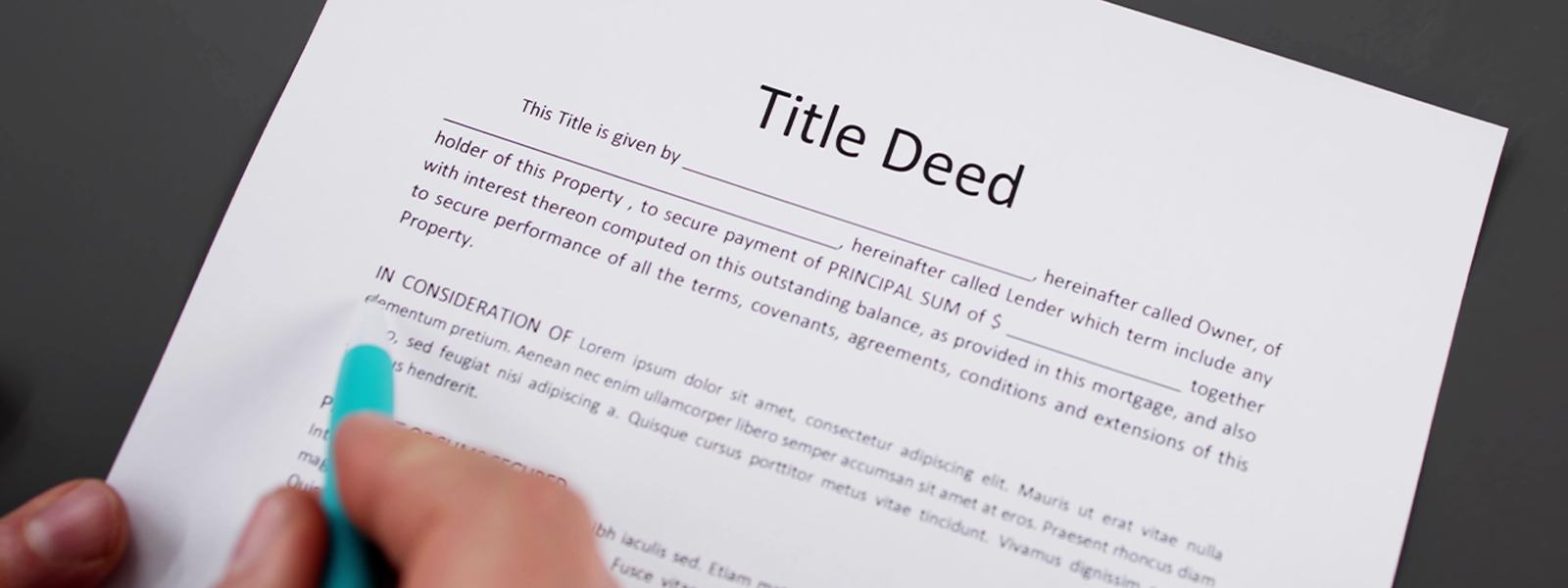What is a Title Deed of Property
May 28, 2024 in Property Guide

Owning a piece of property is a significant milestone in one's life. It is not just a tangible asset but a symbol of stability and financial security. When you invest in a property or home, you secure its ownership. But does a mere financial transaction serve as proof that the property ownership is transferred? It is important for the homeowner to secure the title deed. Now the question arises: what is a title deed, and is it necessary? Are title deeds and sale deeds the same thing?
In this blog, we will learn all about a title deed, its necessity, and its details. This will help in the process of selling a house and home ownership.
What is a Title Deed?
Before we understand what a title deed is, it is important to understand the definition of "deed". The deed is a signed document which specifies the person who owns, transfers, and inherits the asset.
A Title Deed is a legal document that serves as evidence of property ownership. It is also known as a property deed or deed of title. The document outlines the property owner's rights, responsibilities, and obligations. It contains vital information such as the property's legal description and details of the owner. Along with that, the deed also specifies any encumbrances or restrictions on the property. If an owner sells his house, he makes it formal through a legal document. The document permits this procedure and makes everything official.
On the other hand, when you purchase a property, you acquire more than the physical structure. It also gives you the rights to the land and any improvements on it. The Title Deed is an official acknowledgement of this transfer of ownership. It is provided by the seller to the buyer.
Types of Title Deeds
There are several types of Title Deeds, and each serves a specific purpose. The most common types include –
- General Warranty Deed : This type of deed gives the highest level of protection to the buyer and guarantees that the seller has a clear title to the property. This also defends the buyer against any claims. In case any issue arises, the buyer can also get compensation. A warranty deed is not issued generally.
- Special Warranty Deed : The special warranty deed only guarantees that the seller has not incurred any title issues during their ownership. It does not cover problems that may have existed before the seller owned the property.
- Quitclaim Deed: This deed transfers the seller's rights to the buyer without any warranties. It offers the least protection to the buyer. The deed does not guarantee the absence of title issues.
- Sale Deed : This is one of the most common title deeds. It is created at the time of selling the property. It transfers the ownership rights in exchange for money. This legal document is registered at the office of the sub-registrar.
- Gift Deed : The title deed is where the owner transfers the property rights to someone as a gift. This legal document does not involve money for ownership rights. It needs to be registered at the sub-registrar office.
- Mortgage Deed : This type of deed is created in the situation of a loan. The individual who takes up a loan keeps his property as a security. So, if there is a payment default, the money can be recovered through the property. This title deed includes the mortgage's terms and conditions.
How to Register a Title Deed?
Title deed registration is a formal process involving documentation and a record of property ownership. This ensures that the legal owner of a property can enjoy his rights without intervention.
Steps for Registration
- Successful verification of the documents
- Registration fees payment
- Submission of paperwork to the required government authorities
Importance of Accurate Documentation
Having the proper documents by your side is crucial for successfully transferring ownership. It ensures that there are no legal complications in the future. If the documents of your property are on record, this will give clarity on boundaries. No third party can claim any right on that specific asset.
Outcome of Registration
The outcome means you have the Title Deed in your hands. This serves as proof of ownership and is important for future transactions, loans, and legal disputes. It provides security to the property owner and potential buyers.
Tips for a Smooth Registration Process
Here is how you can smoothly secure the Title Deed –
- Prepare and organise all legal documents beforehand
- Pay attention to details and do not miss any document or step
- Seek professional guidance, if needed
- Comply with all legal requirements to avoid delays and complications
Secure the Title Deed and enjoy the rights to your property without any dispute.
Many times, people use title deeds and sale deeds interchangeably. But there is a fine line between the two. Let's take a closer look to understand the two terms.
Sale Deed Vs Title Deed – What is the Difference?
"Sale Deed" and "Title Deed" are often used interchangeably. However, they refer to different documents in the property transaction process. Let us examine the differences:
1. Legal Right Establishment:
Title Deed:
- Establishes the legal right of ownership over a specific property.
- Serves as a formal document transferring the title (ownership) from one person to another.
Sale Deed:
- A tangible and registered document containing a legal notification transferring ownership.
2. Creation Process:
Title Deed:
- Created through the property registration process when purchasing a property.
- Often confused with the sale deed, specifically focusing on the legal transfer of ownership.
Sale Deed:
- Created and registered, serving as proof of ownership over the asset.
3. Content and Details:
Title Deed:
- Contains vital information such as the property's legal description and details of the owner.
- Specifies any encumbrances or restrictions on the property.
Sale Deed:
- Includes property description, sale consideration, terms, and conditions.
- Tracks the history of title holders for the property.
4. Nature of Document:
Title Deed:
- Often considered the document proving legal ownership.
Sale Deed:
- Tangible and always in a documentary form.
5. Transition and Transformation:
Title Deed:
- Represents the legal transfer of ownership rights during property transactions.
Sale Deed:
- Once registered, transforms into the title deed, serving as ongoing proof of ownership.
Benefits of Title Deed
The title deed does not only define the property ownership. It holds several crucial benefits for property owners –
- Legal Recognition: This title deed is the legal proof of property ownership. It provides a recognised and accepted record of who owns the property.
- Protection Against Fraud: Having a legal document reduces the risk of property fraud. It ensures that only the rightful owner can transfer or sell the property.
- Facilitates Legal Transactions: A signed deed is important at the time of selling or transferring a property. It simplifies and legitimises the process, providing a clear record of the transaction.
- Access to Financing: Lenders often require a title deed as collateral when providing loans. It adds a layer of security for both the borrower and the lender.
Is a Title Deed Necessary for Selling My House?
A title deed is indispensable when selling a house. Without a valid document, the legality of the property ownership comes into question and can potentially hinder the sale process. Prospective buyers and their lenders typically conduct their due diligence. A missing or defective title deed at this juncture can raise red flags and lead to delays or even cancellation of the sale.
The Title Deed is the key player in property transactions. It assures all parties involved – the buyer, the seller, and any financial institutions of the validity of the transaction.
Conclusion
The title deed is as an important link between the rights and responsibilities of property ownership. It is crucial for anyone entering into a property transaction. Remember, title deeds are essential for smooth property transactions, ensuring clarity and legitimacy in property ownership.
Go through trusted names in the real estate world, such as Adani Realty, to kickstart your journey of property ownership in terms of homeowners or investment. Adani Realty is a trusted real estate developer offering luxury residential flats at great locations in Mumbai, Ahmedabad, Gurgaon, and Pune for investment and residential purposes.
Looking for dream spaces, not sure where to start?
Leave us a query and our representative will get back to you.
Disclaimer
The Adani Realty expressly disclaims all liability in respect to actions taken or not taken based on any or all the contents of this Blog. The content of this blog is collation of data from various sources and is provided only for information purpose only and Adani Realty does not canvass the particulars, information, brand or any other materials mentioned in the blogs nor does it obtain any monetary benefit from the same.The Adani Realty shall in no circumstance be held liable for any expense, loss or damage including, without limitation, direct, indirect or consequential loss or damage, or any other expense, loss or damage whatsoever arising from the use of data, information, interpretation, judgement or opinion arising out of or in connection with the use of this Blog. Reader is advised to read and apply his/ her intellect and discretion in this regards.

